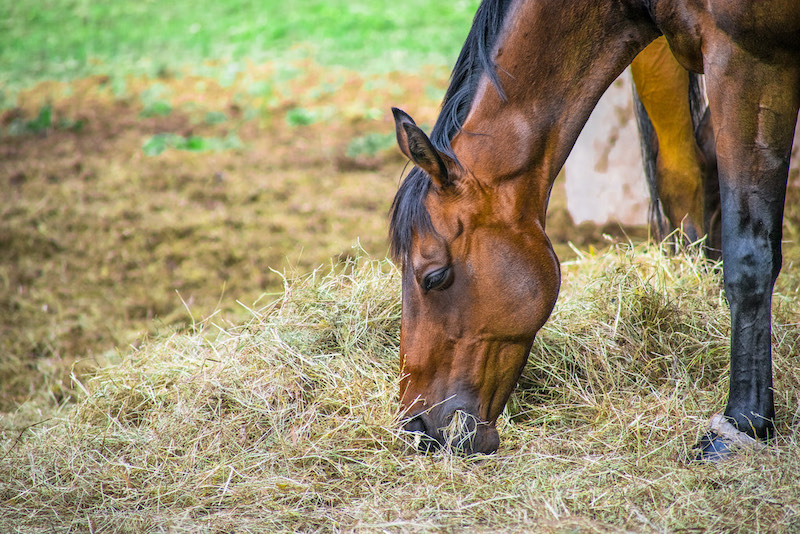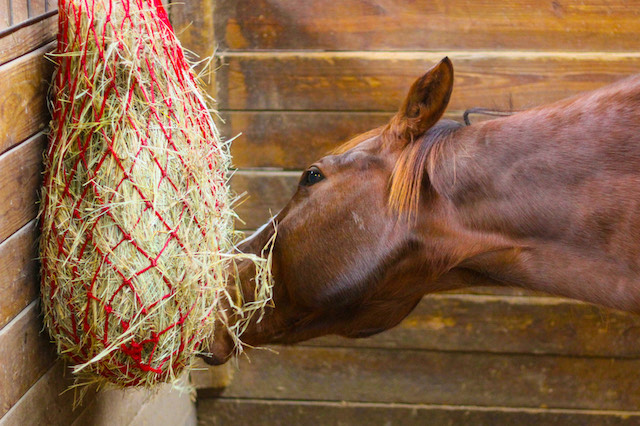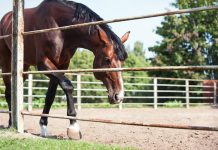You can do a lot of different things when it comes to feeding your horse, and he’ll be fine. You can feed out of a pink bucket or a blue one. Doesn’t matter. There’s a bewildering away of bagged feed products, mostly pretty good, that are also attractively packaged and heavily advertised.
You can give any number of supplements, and if it makes you happy, and you’re not hurting your horse, then I’m really happy that you’re caring for him. Carrots, watermelon, oranges, dates, potatoes – all things that people have told me that their horses eat – I’m all good.
However, like it or not, when it comes to feeding, you have to follow seven absolutely hard and fast rules. If you don’t follow these rules, your horse will suffer for it. Seriously: just these seven.
Dinnertime!

1. The majority of your horse’s diet must be made up of forage. Most of your horse’s diet has to consist of pasture, hay, or fibre products. Watermelon is a great snack, but your horse can’t live on it. Don’t give your horse grain unless he has some specific caloric need. Horses are made to live on forage. Just go with it – that’s the way it is.
2. Your horse should always have unlimited access to fresh, clean water. Some things are just so obvious that they don’t need much discussion. If your horse has a trough or automatic waterer, make sure it stays clean. Here’s a tip: You may not want to drink out of your horse’s water source, but you should at least be able to consider doing it.
3. You should always feed a good-quality feed. While it’s not true across the board, there’s at least some truth to the saying, “You are what you eat.” Works for horses, too. Poor quality feeds (eg brown, mouldy, dusty hay) lack just about everything that feed is supposed to provide your horse. Mould, dust, and fungus aren’t good for your horse; and they can make your horse sick, as well. A lack of green colour in hay, for example, means that a lot of the nutritional value is gone. If you don’t care enough about your horse to feed the best feed that’s available, I think you should either sell him, or find him a good home. You’ll probably both be happier in the long run.
Working horses may need extra energy

4. If your horse needs extra energy, give it to him (or her). If your horse is too thin (for example, if his rib cage looks a lot like the profile of a harp), he needs more energy. In this case, “energy” is just another way to say, “calories.” So, for example, if your horse is exercising a lot, he will need a lot of calories, because he’s using them up jumping over fences, pulling carriages, or trotting in place (depending on your discipline). If you’ve got a mare who is making milk for her foal, she’s likely to need some more energy, because producing milk takes a lot of calories, and her baby is going to be drinking a lot of milk. Maybe your old horse needs some extra energy to keep his weight up – that can happen with older horses.
While the best way to get more energy (that is, calories) is to give a horse more forage, more forage doesn’t always solve the problem. There are two problems here. One is that the horse’s stomach really isn’t very big, considering how big the horse is. Two is that hay is bulky. Horses that need a lot of calories can fill up on hay before they can get enough calories in their systems (if you want to get technical, it’s called being “bulk limited.”) So, for some horses, even if you give them free choice forage, they still have trouble staying at a good weight.
Horses with extra energy needs need extra calories. Extra calories are commonly provided in the form of grains (such as oats), but they can also be given in the form of fats, either as oils (such as corn or vegetable oil), or in fat-containing foods such as rice bran. In some areas, pulp from sugar beet is popular, but it’s not as calorie-dense as grain, and certainly not as dense as fats. Beet pulp does help some horses gain weight, but some horses don’t like the taste.
5. If you decide to feed your horse grain, never give him more than 2kg at one feeding. Horses that are asked to run a lot, for example, racehorses, are often given grain. So, these horses get fed a lot of oats, or other grain mixes. However, too much grain, especially when it’s given all in one feeding, can really cause the horse some problems. Excessive feeding of grain has been associated with the development of gastric ulcers. Too much grain also has the potential to cause your horse problems such as laminitis.
6. Feed regularly, and at least twice a day. In the wild, horses eat in 23 of 24 hours a day. If you can mimic that, your horse will love you for it, I’m sure. Otherwise, you’ll have to make some adjustments. Smaller, more frequent meals are much more like how the horse is intended to eat. Plus, you can get more feed into your horse if you spread it out over time.
Too much to ask of a horse
7. If you make dietary changes for your horse, do them, slowly. Ideally, this is over a period of a couple of weeks (for a variety of reasons, including colic prevention). Once you understand what you must feed your horse, actually feeding your horse becomes mostly a matter of knowing what you want. If you want to feed your horse lucerne hay for more protein and energy, that’s great. If you’d prefer to go with a lower-calorie grass hay, super. But if you decide to make a change, do it gradually, and particularly if you are going from a less fibrous feed (lucerne) to a more fibrous one.
If you have well-defined goals as to what you want from your horse (from a nutritional point-of-view), you can fairly easily choose feed items that might help you reach them. Just keep in mind these few basic rules, and everything will be just fine (and probably a lot easier for you, too).

ABOUT THE AUTHOR
Dr. David Ramey is an equine vet based in Southern California, where for more than 30 years he has specialised in the care and treatment of sport and pleasure horses. He is also a blogger, internationally-recognised author, with 13 books to his name. You can read more on his popular blog, www.doctorramey.com/ of find him on Facebook www.facebook.com/DRRameyDVM/








